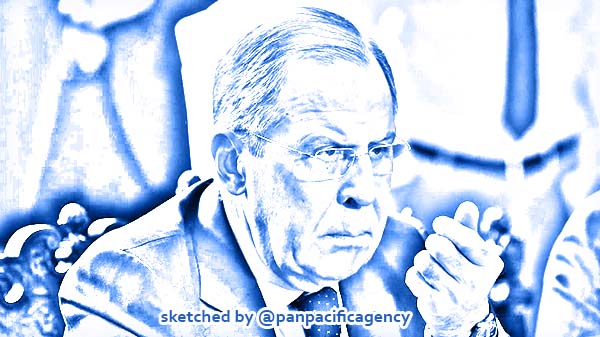Russian FM suggests announce New START extension to avoid vacuum in arms control

Russian Foreign Minister Sergey Lavrov. Photo: Nikkei Asian Review. Sketched by the Pan Pacific Agency.
WASHINGTON D.C., Dec 11, 2019, TASS. Russia and the United States should announce the extension of the New START treaty to avoid vacuum in the arms control sphere, Russian Foreign Minister Sergey Lavrov said on Tuesday after talks with US Secretary of State Michael Pompeo, TASS reported.
“We spoke today about the future of… treaty which is automatically expires in February 2021 is it is not extended. I mean the Treaty on the Further Reduction and Limitation of Strategic Offensive Arms. Russia has reiterated its proposal to take a decision right today to extend this agreement,” he said.
“Naturally, this situation requires talks because there is not a single concrete proposal from our American partners on the table. In the meantime, to avoid vacuum, Russia and the United States, as two biggest nuclear powers, could announce the extension of the New START and somewhat mollify the global public opinion this way, It would be good,” he said.
He said that strategic stability was a central topic at his talks with Pompeo. “We drew attention to the negative consequences of the US’ withdrawal from the INF Treaty. We stressed that in the current situation when the treaty has ceased to exist we don’t want to leave the sphere of strategic stability unattended,” Lavrov told a news conference.
According to the Russian top diplomat, Moscow’s proposal to Washington to adopt a statement on the inadmissibility of nuclear warfare is still on the table.
“We also repeat our proposal to adopt, following the example of the former Soviet Union and the United States, a statement at the presidential level on the inadmissibility of unleashing a nuclear war. This proposal in still on the table,” he said.
Multilateral deals
Russia is ready to consider the possibility of creating a multilateral arms control format if China voices support to this initiative, Lavrov said.
“On the issue of China, [Russian] President [Vladimir Putin] has repeatedly said that if the People’s Republic of China is ready to join, we will support this approach,” the Russian top diplomat said. “Naturally, in this situation we will also have to turn to other nuclear powers, both official and unofficial ones.”
“If the Republic of China is ready, we will also be ready to consider a multilateral process,” Lavrov added.
He said on issues of China’s nuclear arsenals were among the topics discussed with Pompeo.
“China is located geographically far and lags serious behind both Russia and the United States [in terms of nuclear weapons stockpiles]. We spoke about that today, discussed statistics on China’s nuclear arsenals provided by the Stockholm International Peace Research Institute. As compared with Russia’s and the United States’, they are incomparable,” he told a joint news conference.
Moscow calls on Washington not to delay the issue of possible extension of the Treaty on Measures for the Further Reduction and Limitation of Strategic Offensive Arms. The United States says a new arms control treaty is to be signed with Russia, China and, probably, some more countries.
New START
The Treaty between the United States of America and the Russian Federation on Measures for the Further Reduction and Limitation of Strategic Offensive Arms (the New START Treaty) entered into force on February 5, 2011. The document stipulates that seven years after its entry into effect each party should have no more than a total of 700 deployed intercontinental ballistic missiles (ICBM), submarine-launched ballistic missiles (SLBM) and strategic bombers, as well as no more than 1,550 warheads on deployed ICBMs, deployed SLBMs and strategic bombers, and a total of 800 deployed and non-deployed ICBM launchers, SLBM launchers and strategic bombers.
The New START Treaty will remain in force for 10 years, until 2021, unless it is replaced before that date by a subsequent agreement on the reduction and limitation of strategic offensive arms. It can also be extended for no longer than 5 years (that is, until 2026) by the parties’ mutual consent.